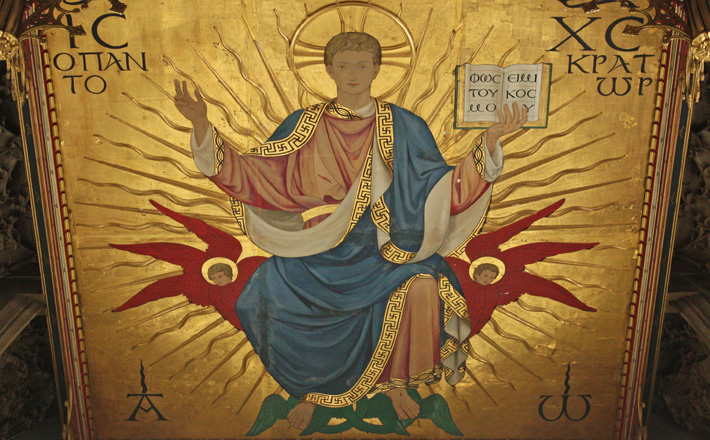Commentary on Ephesians 1:11-23
This is a rich text, packed with theological nuggets for the interpreter to explore.
A temptation might be to try to do justice to the entire text. This could lead to a fragmented message and confused listeners. It is better to highlight a few themes rather than overwork the passage. Three subjects leaped out at me as I was studying Ephesians 1: sainthood, election and lordship.
Who is a Saint?
I once worked with a pastor who made it practice in worship after baptisms (infant baptism was the norm in this congregation) to walk down the aisle holding the child and introducing him or her to the people with the title “saint” before the baptized’s name. It was a little jarring to hear “saint” applied to the name of a baby but this pastor was on to something. In Paul’s understanding the title “saint” belongs to those who have been united with Christ. He routinely calls the members of his churches “saints” (Ephesians 1:1 and 1:15) because of who they are in Christ and not because of what they have accomplished.
It might be worthwhile on this celebration of All Saints Day to remind listeners of this. Our culture still tends to identify “saint” with someone who has done something extraordinary and this leads people to conflate Christianity with morality. So let’s be clear on this point. Our designation as saints comes from our rich inheritance of Christ’s righteousness (Ephesians 1:11).
Chosen?
The language of election is unmistakable in our passage. We have “obtained an inheritance” and we “have been destined according to the purpose of him who accomplishes all things … ” (Ephesians 1:11). These phrases echo a theme from the section just prior to ours where Paul says God “chose us in Christ before the foundation of the world” (Ephesians 1:4).
The topic of election is bound to raise questions for listeners. In a culture where equality is held up as an ideal, talk of election sounds privileged and elitist. Other concerns are raised about morality. If people view themselves as elected or chosen, then won’t they presume upon God’s grace and lead dissolute lives? Teachers and preachers have long faced such excellent questions. It might be helpful to review some of Paul’s responses to the anxiety stirred up by election.
First, remind the people that Paul’s use of election reflects his own heritage as a Jew. The people of Israel were God’s elected people. But note that they were chosen by God so that the whole world would be blessed through them (see the promise to Abraham in Genesis 12:3). In other words, election is for the sake of the world and not a separation from the rest of humanity. It is not supposed to feed speculation about who is “in” and who is “out.” Nor is it license to simply sit on our hands and not do anything. Rather, election implies a significant responsibility. One is chosen so that one might be an instrument of God’s purposes in the world. But always keep in mind that it is God’s purpose and not our own. We tend to get the two confused!
Second, election is meant to be comforting. Notice Paul’s stress that we are “chosen in Christ” (Ephesians 1:4). The one who has chosen us is the very one who dies on the cross for us. Anxiety about whether or not one is chosen is really a bigger question about God’s mercy. Can I really trust God with my salvation? There is only one possible response to this: “Wretched man that I am! Who will rescue me from this body of death? Thanks be to God through Jesus Christ our Lord!” (Romans 7:24-25). All fear about election is put into proper perspective when we realize that the one coming to judge is the one who was judged for our sin.
Mixing Politics and Religion
Many Christians lifted up as examples in the church’s history have found themselves in opposition to kings, rulers and governments. Sometimes we forget that to confess Christ as “Lord” was a political statement in Paul’s day. We have a tendency to spiritualize Scripture and miss the political messages. But to say Christ was Lord in the first century also meant that you were denying that Caesar was Lord. That could be dangerous and could lead to prison or even death.
So when Paul stresses in Ephesians that not only is Christ seated at the right hand of God (Ephesians 1:20) but then goes on to remark that he is “far above all rule and authority and power and dominion, and above every name that is named” (Ephesians 1:21), he is saying something about the relative power of governments and rulers. While they certainly are to be respected (see Romans 13:1-7), they are not be equated in any way with the dominion of Christ himself.
Preachers and teachers in the church always walk a fine line between respect for legitimate political authority and ultimate loyalty to God in Christ. It is easy to forget the blessings of good government. At the same time, we must remember the frequent temptation to worship the nation in place of God. As the prophets warned Israel, this invites God’s judgment. The art of preaching calls for the gift of discernment in matters political.
When our communities are drifting toward cynicism (as suggested in the complaint about politicians that “they are all crooks”) it is our duty to underline the gift of government and the importance of civic involvement (voting, staying informed on issues, etc.). When our communities are in the grip of an uncritical patriotism, it is our obligation to remind our people of the difference between God and country.


November 3, 2013